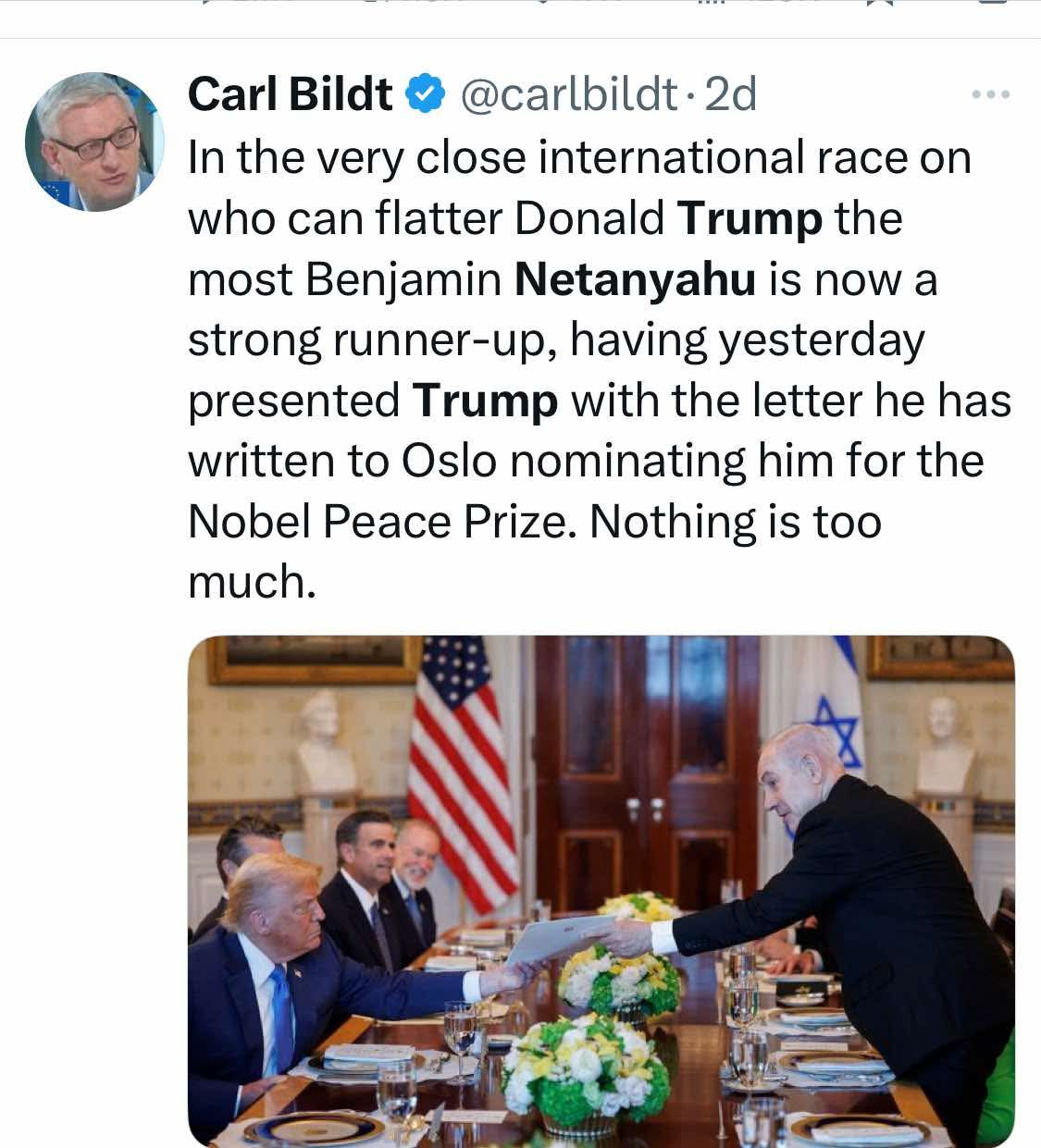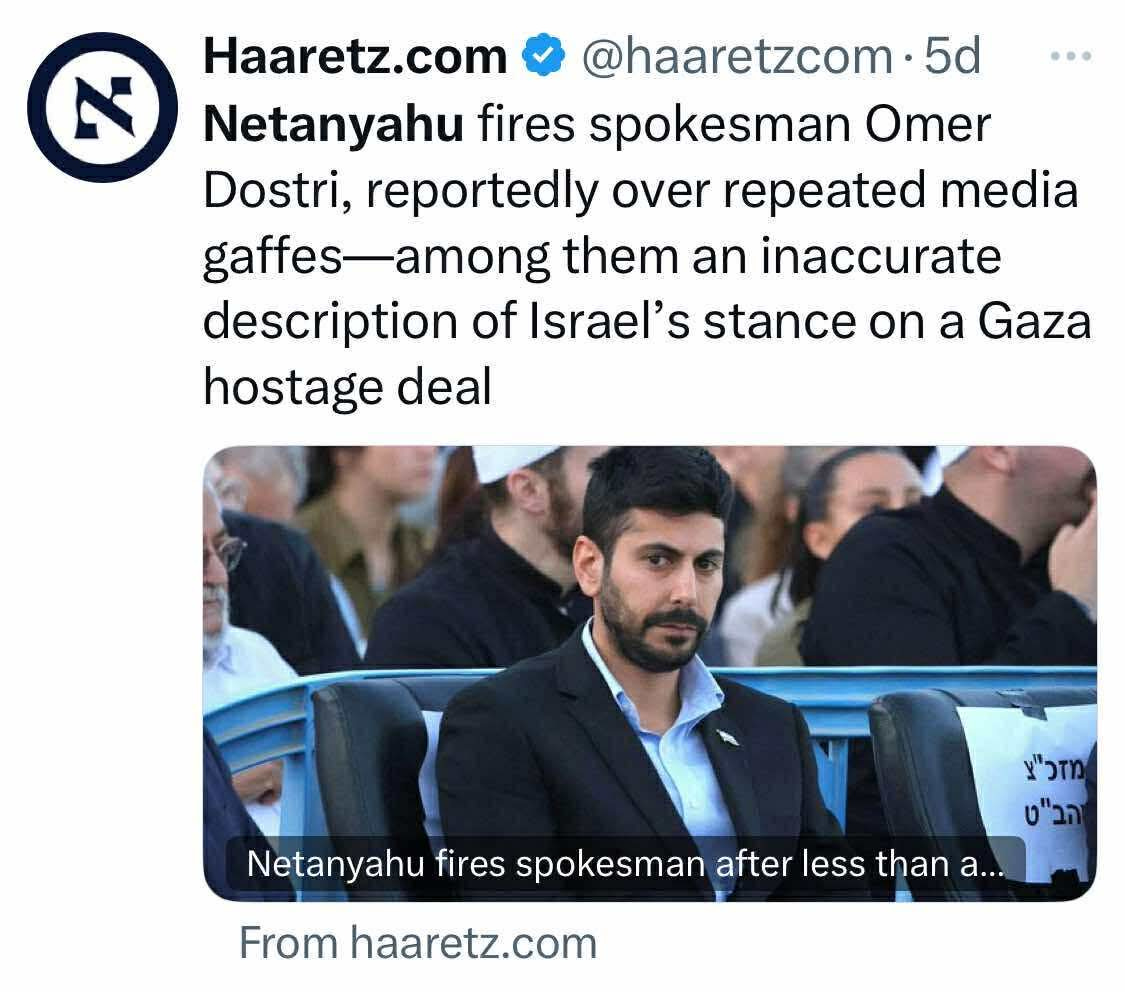Israel at War - Day 643 of the Gaza War
1. PM Netanyahu Visits DC, Meets Twice with President Trump
PM Netanyahu traveled this week to Washington D.C. with his wife for meetings with President Trump and other senior U.S. administration officials. The agenda for the meetings with President Trump included the proposed Gaza ceasefire and hostage deal, and joint messaging on recent strikes against Iran. This, while talks between the U.S, Qatari and Egyptian mediators and the Israeli delegation continue attempting to reach a ceasefire/hostage deal agreement.
Key points in the proposal include a phased hostage-for-prisoner swap, with at least ten living Israeli hostages already agreed to for release, entry of humanitarian aid into Gaza and its distribution, and a partial withdrawal of Israeli forces from Gaza. The main issue of contention is Hamas’s demand for complete withdrawal following the 60-day ceasefire, while Israel is proposing the establishment and interim administration of a humanitarian tent city in Rafah at the southern edge of the Gaza Strip. According to Israeli media sources, PM Netanyahu supports the plan, suggested by Defense Minister Israel Katz. A senior source quoted PM Netanyahu who said: "the plan is essentially to move all civilian Gazans south, to a large tent city in Rafah, where they will have hospitals and plenty of food."
Both Netanyahu and Trump were quoted in the media regarding a possible breakthrough in negotiations, and some Israeli media sources emphasized the full coordination between the two leaders. However, to date, no formal statement was made regarding an agreed upon ceasefire. A senior Israeli official told Reuters the deal might be finalized in one to two weeks
The timing of Netanyahu’s visit closely followed joint strikes on Iranian nuclear facilities last month. Underlining their strategic alignment, Netanyahu and Trump described the operation as a major setback for Iran’s nuclear ambitions. Trump’s Middle East envoy, Steve Witkoff, signaled that U.S.–Iran negotiations may resume soon, “from a position of strength.”
Despite the lack of tangible results for the D.C. visit, some Israeli media sources highlighted the symbolic significance of the visit and the meetings between the two leaders, referring, among other things, to the gift that PM Netanyahu presented President Trump in the form of a letter nominating him for the Nobel Peace Prize. The nomination lauded Trump’s role in brokering the Abraham Accords, initiating a Gaza ceasefire push, and coordinating decisive strikes on Iranian nuclear sites.
It should be noted that the gesture raised eyebrows for several reasons. First, the Nobel nomination deadline has already passed. Second, public endorsements violate the confidentiality required for valid Nobel Peace Prize nominations.
2. PM Netanyahu Dismisses Spokesman Days Before the PM Departed to D.C.
PM Netanyahu has dismissed his spokesperson, Dr. Omer Dostri, just ahead of his planned trip to Washington. While the Prime Minister’s Office officially described his exit as a mutual decision, several Israeli media outlets attribute his sudden departure to ongoing disputes with Sara Netanyahu, the Prime Minister's wife, adding that Ziv Agmon, a Likud member who reportedly has close ties to her, is a likely replacement. Agmon recently joined the PM’s office communications’ team and accompanied PM Netanyahu and his wife to D.C.
The PM’s Office has firmly rejected suggestions of Sara Netanyahu’s s involvement in the decision and said: “the media is quick to turn Mrs. Netanyahu into its punching bag whenever it can… Mrs. Netanyahu had no involvement in Dostri's hiring or dismissal”, adding that the decision was made through internal coordination between Netanyahu, his chief of staff, and Dostri himself.
The media also reported, citing sources from within the PM’s office, as well as other sources, that before his dismissal, Dostri was criticized for security missteps, including publishing internal photos from military operations without clearance, as well as issuing inaccurate or premature statements—such as reporting a controversy over a Hamas hostage list that required a public correction. Dostri was also under public scrutiny for his contentious relationships with journalists, after he removed several political correspondents from several Prime Ministers Office WhatsApp groups.
3. American Multinational High-Tech Corporation, Nvidia, to Open Large Development Center in Israel
Nvidia announced its plans to open a huge center in Northern Israel. By doing so, it will become the largest employer in the country. Nvidia’s decision reflects a deep faith in the Israeli economy. Right now there are 5,000 people employed by Nvidia in Israel, 15% of the firms worldwide. Nvidia is one of the biggest tech corporations in the world.
Another multinational high-tech corporation, Intel, has 9,000 employees in Israel but recently there were indications that it may have to let go many of their employees.
The judicial overhaul that PM Netanyahu tried to pass through legislation, as well as the length of the prolonged war in Gaza, and the total fragile security situation in Israel was threatening the strength of the high-tech sector in Israel. For years Israel liked to perceive itself as a start-up nation, with credit for some of the most successful tech companies like Wix, Mobileye, and Checkpoint, to name only a few. In the past three years, since this government took office there seemed to be a decline in the investments of tech companies.
Nvidia’s announcement enhanced trust in the Israeli market, economy and its’ stability.
4. Israeli Knesset Frozen Due to Haredi Boycott
The Haredi parties, major partners of PM Netanyahu’s coalition, decided to abstain from voting on all government legislation. The Haredi members of the coalition are protesting against the government with its failire to pass a bill that will formalize and legalize the exemption of Yeshiva boys from the draft law.
The story of the draft for the Haredim dates from the establishment of the State of Israel, when the founding father, David Ben Gurion agreed to exempt 400 Yeshiva boys from the mandatory draft as a compromise with the leading Rabbis of the community so they would vote in favor of the establishment of the state. Since then, the numbers of the Yeshiva boys have grown and it is currently estimated that more than 40,000 are exempted from the draft. During the years, there have been several attempts to reach an agreement with the Haredim. The leading Rabbis of the community deeply believe that it was Yeshiva studies that saved the Jewish people over their years in exile, and that studying Torah and the Jewish Bible continue to safeguard the Jewish people. They compare studying Torah with fighting in the army. The arrangement that they are not drafted to the army was generally accepted over the years. But in the last war it surfaced as a contentious issue. The mandatory draft is imposed on all 18 years old Jewish boys and girls, except the Haredim. The long and intensive war in Gaza, the confrontation with Hizbollah in the north and with Iran was too much to contain and the serving sector could no longer accept the fact that tens of thousands of young boys are not taking part and are not sharing the heavy burden of defending the country.
PM Netanyahu promised the Haredi political leaders that by joining the coalition, his government will pass a bill and settle this issue once and for all. But the coalition failed to do so, mainly due to increased anger and resentment from the serving sector, that invested months in both regular service and the army reserves. Recently the Haredi parties started pushing back and initiated a protest by withholding their votes supporting legislation in the Knesset. This act has paralyzed the ability of the government to pass any legislation. There is fear in the coalition that the protest may dissolve the Knesset and result in early elections before their due date of November 2026.
5. Houthis Continue to Attack Israel with Missiles
Despite the ceasefire with Iran, and the fact that President Trump announced a truce with the Houthis, the organization that controls parts of Yemen, the Houthis continue to launch missiles towards Israel. Early Thursday morning they launched one ballistic missile towards Israel, sending hundreds of thousands of people to seek shelter. The Houthis have announced time and again that they will not stop until the war in Gaza ends. The Houthis also attacked cargo ships on their way from Southern Asia to the West. One of the ships sunk, four sailors died, and fifteen others are still missing.
The major problem with the missiles is not only the intimidation but the fact that they try to target Israels’ Ben Gurion International airport. Israeli airspace was closed for more than twelve days during the recent war with Iran, which resulted in about 150,000 Israelis who were stuck all over the world not being able to get back home, as well as tens of thousands of tourists and Israelis who live abroad stuck in the country. Only last week international airlines slowly re-opened their routes to and from Israel. If the Houthis succeed in their aims, they may once again halt all air traffic to and from Israel and meaningfully impact summer vacations and trade.
Unfortunately Israel does not have significant leverage over the Houthis despite the fact that Israeli jets have managed to bomb targets in Yemen.










